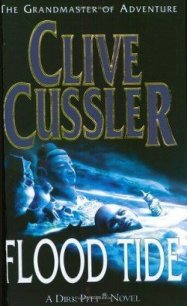Black Wind - Cussler Clive (книги полностью бесплатно txt) 📗
For to the horror of health care and public officials, the veracity of the chimera virus would suddenly come to life. By virtue of its re-combinant strength, the killer bug would prove itself largely immune to the U.S. stockpiled smallpox vaccinations. With the death toll mounting, distressed health officials and scientists would scramble to develop an effective vaccination that could be mass-produced, but that would take months. In the meantime, the viral plague would begin sweeping across the country like a tidal wave. Tourists and travelers from Los Angeles would unknowingly carry the live virus to points all over the nation, sparking new outbreaks in a thousand different cities. As the vaccinations were found to be ineffective, authorities would resort to the last available means of stopping the epidemic: mass quarantine. Public assemblies and gatherings would be banned in a desperate attempt to halt the viral storm. Airports would close, subways halted, and buses parked as mandatory travel restrictions would be imposed. Businesses would be forced to furlough employees while local governments curtailed their services to avoid debilitating their entire workforce. Rock concerts, baseball games, and even church gatherings would all be canceled in fear of sparking new outbreaks. Those who would venture out for food or medicine would only do so clad in rubber gloves and surgical masks.
The economic impact to the country would be devastating. Whole sale industries would be forced to shut down overnight. Furloughed and laid-off workers would spike unemployment rates to double that of the Great Depression. The government would teeter on insolvency as tax revenues would dry up while the demand for food, medical, and social services would explode. In a few short weeks, the national output would fall to the level of a third world country.
A further crisis would ensue in defending the national security. The highly contagious disease would rip through the armed forces, infecting thousands of soldiers and sailors living in close quarters. Entire army divisions, air wings, and even naval fleets would be incapacitated, reducing the effective military force to a paper tiger. For the first time in nearly two centuries, the country's ability to defend itself would be seriously endangered.
In the civilian population, health facilities and morgues would be stretched beyond their breaking point. The number of sick and dying would quickly reach a critical mass, overwhelming available resources. Despite operating around the clock, the country's available crematories would rapidly be overrun with the dead. Like a scene from Mexico City at the conquest of Cortes, stacks of dead bodies would accumulate in overwhelming numbers. Makeshift crematories would hastily be assembled to burn the dead in mass, reproducing the ancient funeral pyres of old.
In homes and apartments, citizens would be forced to live like incarcerated prisoners, afraid to mingle with neighbors, friends, or even close relatives for fear of risking infection. Rural inhabitants would fare best, but in the major cities few families would be spared the affliction. The diseased would be carefully quarantined while family members burned sheets, towels, clothing, furniture, and anything else that might have caught an ambient germ.
The lethal virus would take a deadly toll across all ages and races. But hardest hit would be working adults, forced to expose themselves to greater risk of infection in order to provide food for their families. With millions of adults lying dead, the raging disease would create an immense class of orphaned children across the land. In a terrible replay of Western Europe after World War I, an entire generation would nearly be lost, vanished in just a few months' time. Only a SARS-like containment of infected travelers, after being alerted by the initial U.S. outbreaks, would prevent the scourge from decimating other countries in a similar fashion.
To those infected, the disease would wreak a rapid and horrifying progression of agony. Following the two-week incubation period, a burning rash would emerge on the infected after the initial onset of fever, starting in the mouth and spreading to the face and body. The stricken would be highly contagious at this stage, where face-to-face contact, or even shared clothes and bedding, would easily spread the disease. Over the course of three or four days, the rash would expand and painfully develop into hard raised bumps. The mass of horrid-looking skin lesions, produced with the sensation of a hot torch to the skin, would then gradually dry and scab over. For two to three more weeks, the afflicted would battle the body-morphing disease until all of the scabs had fallen away and the last risk of transmission subsided. All the while, the sick would be forced to fight it alone, as smallpox has no cure once the virus is unleashed in the body.
The survivors, if lucky, would be left with just the telltale pitted scars on their skin as a constant reminder of their ordeal. Less fortunate survivors would end up blind as well. The one-third of infected persons who lost the fight would die a painful death, as their lungs and kidneys slowly shut down under the viral onslaught.
But the horror would not end there. For still hidden in the smallpox outburst was the specter of HIV. Slower acting and less detectable but all the more deadly, the HIV attributes not only made the chimera virus resistant to the smallpox vaccine but continued a viral path of destruction in the surviving victims. Thriving in an already weakened immune system, the virus would surge through the victims, destroying and altering cells in a barbaric invasion. While most HIV victims succumb to its debilitating effects in the course of a decade, the chimera would attain lethality in just two to three years. Like a satanic roller coaster, yet another wave of death would surge across the country, striking down the poor souls who had overcome the initial bout with smallpox. While the smallpox pandemic would claim a thirty percent mortality rate, the HIV death rate would hover near ninety percent. An already shocked and numbed nation would face a death pall the likes of which had never been seen in its history before.
By the time the chimera ran its course, tens of millions would lie dead in the U.S." with untold more around the world. Not a family would go unscathed by its black touch and not a soul would live free from the fear of a lethal biological shadow in the doorway. Amid the initial unfolding of the scourge, few would pay concern to political disturbances around the world. And, on the far side of the globe, when the old ally of South Korea was overrun by its totalitarian neighbor to the north there would be little response from the devastated nation aside from a feeble cry of protest.
The Chinese junk looked like an antiquated relic amid the modern freighters and containerships swarming about Inchon Harbor. Cussler carefully threaded the high-sterned sailing vessel through a maze of midmorning commercial traffic before easing into a small public marina that was nestled between two large cargo docks. An odd assortment of beat-up sampans and expensive weekend sailboats encircled the marina as he motored the teak junk to a transit dock and tied up. He gave a quick knock on the spare cabin door to wake its slumbering occupants, then brewed a large pot of coffee in the galley as a marina employee refilled the junk's fuel tank.
Summer staggered out into the sunshine of the aft deck holding the dachshund in her arms as Dirk followed a few steps behind, trying to suppress a yawn. Cussler threw a mug of coffee in their hands, then ducked belowdecks for a moment before emerging with a hacksaw in his grip.
“Might be a good idea to off-load those handcuffs before going ashore,” he grinned.
“I'll be only too happy to dispose of these bracelets,” Summer concurred, rubbing her wrists.




